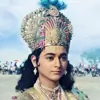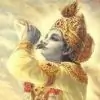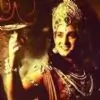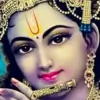Now the time to find and share this text from KMG 😊 Few differences with the serial too - And we can see here the first oath both the parts - giving up the power and brahmacharya but not the second oath.
"Four years had thus passed away (after getting Devavrat from Ganga), when the king one day went into the woods on the bank of the Yamuna. And while the king was rambling there, he perceived a sweet scent coming from an unknown direction. And the monarch, impelled by the desire of ascertaining the cause, wandered hither and thither. And in course of his ramble, he beheld a black- eyed maiden of celestial beauty, the daughter of a fisherman. The king addressing her, said, 'Who art thou, and whose daughter? What dost thou do here, O timid one?' She answered, 'Blest be thou! I am the daughter of the chief of the fishermen. At his command, I am engaged for religious merit, in rowing passengers across this river in my boat.' And Santanu, beholding that maiden of celestial form endued with beauty, amiableness, and such fragrance, desired her for his wife. And repairing unto her father, the king solicited his consent to the proposed match. But the chief of the fishermen replied to the monarch, saying, 'O king, as soon as my daughter of superior complexion was born, it was of course, understood that she should be bestowed upon a husband. But listen to the desire I have cherished all along in my heart. O sinless one, thou art truthful: if thou desirest to obtain this maiden as a gift from me, give, me then this pledge. If, indeed, thou givest the pledge, I will of course bestow my daughter upon thee for truly I can never obtain a husband for her equal to thee.'
"Santanu, hearing this, replied, 'When I have heard of the pledge thou askest, I shall then say whether I would be able to grant it. If it is capable of being granted, I shall certainly grant it. Otherwise how shall I grant it.' The fisherman said, 'O king, what I ask of thee is this: the son born of this maiden shall be installed by thee on thy throne and none else shall thou make thy successor.'
"Vaisampayana continued, 'O Bharata, when Santanu heard this, he felt no inclination to grant such a boon, though the fire of desire sorely burnt him within. The king with his heart afflicted by desire returned to Hastinapura, thinking all the way of the fisherman's daughter. And having returned home, the monarch passed his time in sorrowful meditation. One day, Devavrata approaching his afflicted father said, 'All is prosperity with thee; all chiefs obey thee; then how is it that thou grievest thus? Absorbed in thy own thoughts, thou speakest not a word to me in reply. Thou goest not out on horse-back now; thou lookest pale and emaciated, having lost all animation. I wish to know the disease thou sufferest from, so that I may endeavour to apply a remedy.' Thus addressed by his son, Santanu answered, 'Thou sayest truly, O son, that I have become melancholy. I will also tell thee why I am so. O thou of Bharata's line, thou art the only scion of this our large race. Thou art always engaged in sports of arms and achievements of prowess. But, O son, I am always thinking of the instability of human life. If any danger overtake thee, O child of Ganga, the result is that we become sonless. Truly thou alone art to me as a century of sons. I do not, therefore, desire to wed again. I only desire and pray that prosperity may ever attend thee so that our dynasty may be perpetuated. The wise say that he that hath one son hath no son. Sacrifices before fire and the knowledge of the three Vedas yield, it is true, everlasting religious merit, but all these, in point of religious merit, do not, come up to a sixteenth part of the religious merit attainable on the birth of a son. Indeed, in this respect, there is hardly any difference between men and the lower animals. O wise one, I do not entertain a shadow of doubt that one attains to heaven in consequence of his having begotten a son. The Vedas which constitute the root of the Puranas and are regarded as authoritative even by the gods, contain numerous proof of this. O thou of Bharata's race, thou art a hero of excitable temper, who is always engaged in the exercise of arms. It is very probable that thou wilt be slain on the field of battle. If it so happen, what then will be the state of the Bharata dynasty, It is this thought that hath made me so melancholy. I have now told thee fully the causes of my sorrow.'
"Vaisampayana continued, 'Devavrata who was endued with great intelligence, having ascertained all this from the king, reflected within himself for a while. He then went to the old minister devoted to his father's welfare and asked him about the cause of the king's grief. O bull of Bharata's race, when the prince questioned the minister, the latter told him about the boon that was demanded by the chief of the fishermen in respect of his daughter Gandhavati. Then Devavrata, accompanied by many Kshatriya chiefs of venerable age, personally repaired to the chief of the fishermen and begged of him his daughter on behalf of the king. The chief of the fishermen received him with due adorations, and, O thou of Bharata's race, when the prince took his seat in the court of the chief, the latter addressed him and said, 'O bull among the Bharatas, thou art the first of all wielders of weapons and the only son of Santanu. Thy power is great. But I have something to tell thee. If the bride's father was Indra himself, even then he would have to repent of rejecting such an exceedingly honourable and desirable proposal of marriage. The great man of whose seed this celebrated maiden named Satyavati was born, is, indeed, equal to you in virtue. He hath spoken to me on many occasions of the virtues of thy father and told me that, the king alone is worthy of (marrying) Satyavati. Let me tell you that I have even rejected the solicitations of that best of Brahmarshis--the celestial sage Asita--who, too, had often asked for Satyavati's hand in marriage. I have only one word to say on the part of this maiden. In the matter of the proposed marriage there is one great objection founded on the fact of a rival in the person of a co-wife's son. O oppressor of all foes, he hath no security, even if he be an Asura or a Gandharva, who hath a rival in thee. There is this only objection to the proposed marriage, and nothing else. Blest be thou! But this is all I have to say in the matter of the bestowal or otherwise, of Satyavati.'
"Vaisampayana continued, 'O thou of Bharata's race, Devavrata, having heard these words, and moved by the desire of benefiting his father thus answered in the hearing of the assembled chiefs, 'O foremost of truthful men, listen to the vow I utter! The man has not been or will not be born, who will have the courage to take such a vow! I shall accomplish all that thou demandest! The son that may be born of this maiden shall be our king.' Thus addressed, the chief of the fishermen, impelled by desire of sovereignty (for his daughter's son), to achieve the almost impossible, then said, 'O thou of virtuous soul, thou art come hither as full agent on behalf of thy father Santanu of immeasurable glory; be thou also the sole manager on my behalf in the matter of the bestowal of this my daughter. But, O amiable one, there is something else to be said, something else to be reflected upon by thee. O suppressor of foes, those that have daughters, from the very nature of their obligations, must say what I say. O thou that art devoted to truth, the promise thou hast given in the presence of these chiefs for the benefit of Satyavati, hath, indeed, been worthy of thee. O thou of mighty arms, I have not the least doubt of its ever being violated by thee. But I have my doubts in respect of the children thou mayst beget.'
"Vaisampayana continued, 'O king, the son of Ganga, devoted to truth, having ascertained the scruples of the chief of the fishermen, then said, moved thereto by the desire of benefiting his father, 'Chief of fishermen, thou best of men, listen to what I say in the presence of these assembled kings. Ye kings, I have already relinquished my right to the throne, I shall now settle the matter of my children. O fisherman, from this day I adopt the vow of Brahmacharya (study and meditation in celibacy). If I die sonless, I shall yet attain to regions of perennial bliss in heaven!'
"Vaisampayana continued, 'Upon these words of the son of Ganga, the hair on the fisherman's body stood on end from glee, and he replied, 'I bestow my daughter!' Immediately after, the Apsaras and the gods with diverse tribes of Rishis began to rain down flowers from the firmament upon the head of Devavrata and exclaimed, 'This one is Bhishma (the terrible).' Bhishma then, to serve his father, addressed the illustrious damsel and said, 'O mother, ascend this chariot, and let us go unto our house.'
"Vaisampayana continued, 'Having said this, Bhishma helped the beautiful maiden into his chariot. On arriving with her at Hastinapura, he told Santanu everything as it had happened. And the assembled kings, jointly and individually, applauded his extraordinary act and said, 'He is really Bhishma (the terrible)!' And Santanu also, hearing of the extraordinary achievements of his son, became highly gratified and bestowed upon the high-souled prince the boon of death at will, saying, 'Death shall never come to thee as long as thou desirest to live. Truly death shall approach thee, O sinless one, having first obtained thy command.'"
"Vaisampayana said, 'O monarch, after the nuptials were over, king Santanu established his beautiful bride in his household. Soon after was born of Satyavati an intelligent and heroic son of Santanu named Chitrangada. He was endued with great energy and became an eminent man. The lord Santanu of great prowess also begat upon Satyavati another son named Vichitravirya, who became a mighty bowman and who became king after his father. And before that bull among men, viz., Vichitravirya, attained to majority, the wise king Santanu realised the inevitable influence of Time. And after Santanu had ascended to heaven.
































